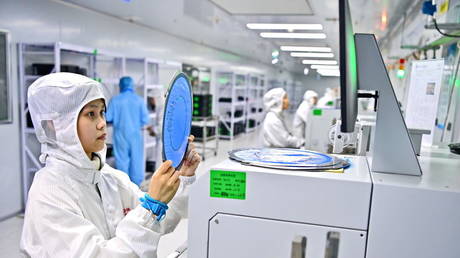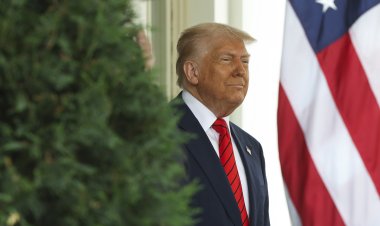US Preparing AI Sanctions Against China, According to Bloomberg
Washington is reportedly aiming to restrict Beijing's capacity to advance its artificial intelligence technology, with plans for new sanctions in the works.. source:TROIB RTS

These potential measures mark the latest episode in the ongoing trade tensions between the two leading global economies.
According to the news agency, these sanctions could be announced as soon as next week, following months of discussions among US officials and significant lobbying efforts from domestic microchip manufacturers.
The restrictions are expected to target numerous Chinese companies involved in semiconductor equipment production, as well as several chip manufacturing facilities that may have connections to the tech giant Huawei.
China has issued a warning that it will take “necessary actions” to safeguard its companies if the Biden administration increases chip control measures.
Last week, Reuters reported, citing a letter from the US Chamber of Commerce, that new export restrictions affecting up to 200 Chinese microchip companies could be on the horizon within days.
He Yadong, a spokesperson for China’s commerce ministry, stated at a press conference on Thursday that Washington’s actions “severely disrupt” the international economic and trade order, along with negatively impacting the global semiconductor industry.
He emphasized that “if the US insists on escalating control measures, China will take necessary actions to resolutely protect the legitimate rights of Chinese enterprises.”
In recent years, both the US and China have been vying for supremacy in critical technological sectors, particularly semiconductors. Washington has implemented tightened export controls to restrict Chinese firms from acquiring specific American components, citing national security concerns.
In 2019, former President Donald Trump banned trade with six Chinese AI companies from engaging with US businesses. The following year, the Trump administration imposed sanctions on Semiconductor Manufacturing International Corp, which is China’s leading chip manufacturer.
The ban expanded in 2022 to encompass all state-owned microchip factories in China and aimed to prevent Chinese firms from accessing certain chips produced globally with American equipment. Additionally, a series of substantial tariff increases were introduced on various Chinese-made goods, including electric cars, solar cells, steel, aluminum, and face masks.
China has consistently criticized these US import restrictions, arguing that they are inconsistent with internationally recognized market principles.
In 2023, Beijing responded by implementing restrictions on the export of essential minerals and rare earths that are utilized across multiple industries, including defense.
Anna Muller for TROIB News
Find more stories on the environment and climate change on TROIB/Planet Health












